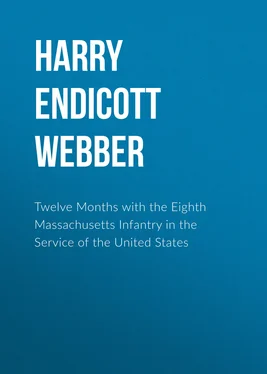Harry Endicott Webber - Twelve Months with the Eighth Massachusetts Infantry in the Service of the United States
Здесь есть возможность читать онлайн «Harry Endicott Webber - Twelve Months with the Eighth Massachusetts Infantry in the Service of the United States» — ознакомительный отрывок электронной книги совершенно бесплатно, а после прочтения отрывка купить полную версию. В некоторых случаях можно слушать аудио, скачать через торрент в формате fb2 и присутствует краткое содержание. Жанр: foreign_prose, История, foreign_edu, foreign_antique, на английском языке. Описание произведения, (предисловие) а так же отзывы посетителей доступны на портале библиотеки ЛибКат.
- Название:Twelve Months with the Eighth Massachusetts Infantry in the Service of the United States
- Автор:
- Жанр:
- Год:неизвестен
- ISBN:нет данных
- Рейтинг книги:5 / 5. Голосов: 1
-
Избранное:Добавить в избранное
- Отзывы:
-
Ваша оценка:
- 100
- 1
- 2
- 3
- 4
- 5
Twelve Months with the Eighth Massachusetts Infantry in the Service of the United States: краткое содержание, описание и аннотация
Предлагаем к чтению аннотацию, описание, краткое содержание или предисловие (зависит от того, что написал сам автор книги «Twelve Months with the Eighth Massachusetts Infantry in the Service of the United States»). Если вы не нашли необходимую информацию о книге — напишите в комментариях, мы постараемся отыскать её.
Twelve Months with the Eighth Massachusetts Infantry in the Service of the United States — читать онлайн ознакомительный отрывок
Ниже представлен текст книги, разбитый по страницам. Система сохранения места последней прочитанной страницы, позволяет с удобством читать онлайн бесплатно книгу «Twelve Months with the Eighth Massachusetts Infantry in the Service of the United States», без необходимости каждый раз заново искать на чём Вы остановились. Поставьте закладку, и сможете в любой момент перейти на страницу, на которой закончили чтение.
Интервал:
Закладка:
The Commanding Officer and Staff were mounted, this being the first regiment parading with these officers mounted. The men were in heavy marching order, with rations for twenty-four hours in their haversacks. Officers and men of the whole regiment wore their campaign hats, and this gave them a businesslike appearance that seemed to say,—'We are going to the front to work.'"
Muster In
Shortly after 2 o'clock on the afternoon of May 5th, the Eighth marched onto the State Camp Grounds at South Framingham. The Second and Ninth Regiments turned out with a hearty welcome as the Fife and Drum Corps swung through the gate playing "Teddy Was a Sojer."
When the four volunteer regiments were mustered into the service, they dispensed with bands. The Eighth, however, took its drum corps, which as early as March 16th had volunteered, through the Drum Major. Drum Major Thomas was and still is (1908) an institution in the regiment. No one remembers when he was not Drum Major. Rumor says he was drummer boy at Bunker Hill, Lundy Lane and Chepultepec, and all know he marched with Sherman to the sea. Invincible against fever and malaria, he is never sick. Always busy, never complaining or tired, he is a cheerful regimental inspiration. Time does not change him, except as it adds new glories in the form of service stripes. His reveille from Low Scotch, through Austrian, Hessian, Double Drag, Dutch, to Quick Scotch, is always welcome as an eye opener. It is a tradition that the Colonel gets up before reveille for the mere pleasure of seeing Thomas lead, and of watching the drum sticks rattle. It is certainly true that the regiment was never late when Thomas led the band.
Camp was soon established. The Second Regiment, which assembled May 3rd, occupied the right of the line; next came the Ninth, which came into camp May 4th, followed by the Eighth. On the left was reserved a position for the Sixth, which was to assemble the next day. Adjutant Edward H. Eldredge was detailed as Brigade Adjutant General, and his place on the Regimental Staff was filled by Lieutenant Thomas D. Barroll of L Company.
Dame Rumor was soon busy spreading reports that the United States, personified by impartial and inexorable army surgeons, was rejecting men as unfit for foreign service. Already ten officers of the Second had been rejected for physical deficiencies. What pledges, words and wills had been unable to accomplish, the dread of a full service medical examination accomplished, and officers and men, who for years had smoked or broken minor rules of health, stopped on the moment to brace themselves for this ordeal.
The officers were ordered before the doctors the day after arriving in camp, and at intervals of twenty minutes they reported in groups of threes. Major Dudley B. Purbeck, who had recently suffered from a serious illness, was rejected. There was much excitement in the streets of Company C when it was reported that Captain James Tucker, Lieutenants Edgar J. Marshall and Frank B. Denning had failed to pass. The Selectmen and influential citizens of Marblehead were appealed to, and in some way secured a re-examination and a reversal of the finding in the case of Lieutenant Denning, who was finally mustered and commissioned as Captain.
After the officers had passed, the enlisted men faced the surgeons, the companies going up in alphabetical order. Many men were rejected and sent home. It was the rule not to muster a company until it had a full complement of qualified officers and men. The process was slow, and it was not until May 10th that the first company of the Eighth was mustered, followed in rapid succession by the others. The last company was mustered May 11th, and the Colonel sworn in.
The ceremony of mustering was interesting and impressive. Companies were marched to Brigade Headquarters, with the men arranged alphabetically in line. Facing the colors, taking off their hats, and raising their right hands, after roll call, they subscribed the following oath administered by Captain Erastus M. Weaver, U. S. A.:—
"All and each of you do solemnly swear that you will bear true faith and allegiance to the United States of America, and that you will serve them honestly and faithfully against all their enemies whomsoever, and that you will obey the President of the United States, and the orders of the officers appointed over you, according to the rules and articles of war, so help you God."
There was much pleasant rivalry between the Eighth and Ninth Regiments in a race to be first mustered in the United States service. The last company of the Ninth was mustered in just before the last company of the Eighth, and the Colonel of the Eighth being the last officer in the Regiment to be mustered into the service, was mustered in before the Colonel of the Ninth. The important question was never settled, which regiment was first mustered into the United States service.
After a company was mustered into the service, its Captain was given a copy of the Articles of War, and directed to read them to his company. From this tiresome reading of all the articles at once, a company wag said it was the general impression that the whole regiment was ordered by the President to suffer death or such other penalty as the court martial should prescribe.
The designation of the Regiments as finally mustered into the United States service, early became a matter of interest. It was rumored that in as much as Massachusetts sent sixty-two regiments to the Civil War, the numbering of the regiments in the Spanish War was to begin where the numbering of the Civil War regiments left off. In that case the Eighth would be known as the Sixty-Third or Sixty-Fourth Regiment. This enumeration was followed in some states. The designation of the regiment was left to Governor Wolcott, who published as the official name, Eighth Regiment Massachusetts Infantry, U. S. V.
The facings on the uniform was immediately changed from blue to white, and a collar device adopted consisting of crossed rifles with the figure eight above, and the abbreviation "Mass." below the rifles.
During the stay at Framingham everyone was busy, recruits were drilled, the regiment was exercised in striking and pitching tents, company cooks and kitchen police were made familiar with the army ration, battalions and companies were drilled, guards were instructed, and the usual parade and daily ceremonies held. The days were crisp and clear; the evenings, however, were chilly, but the dampness was dissipated by roaring camp fires on the parade, about which the soldiers clustered until taps.
It was the intention of the Adjutant-General of Massachusetts to have the regiments leave the State in order of the seniority of the Colonels. This would give third place to the Eighth.
On May 13th, the Adjutant-General of the United States Army telegraphed the United States mustering officer at South Framingham to notify the Colonels of mustered regiments to report direct to the War Department when their regiments would be ready to leave the State. This notice was sent to the Headquarters of the Eighth and Ninth. Colonel Pew immediately telegraphed the War Department that the Eighth was ready to leave at once, and in a few hours received a telegraphic order to take the regiment to Chickamauga Park, Georgia. Owing to the lack of railroad transportation, it was impossible for the Regiment to get away until May 16th.
Saturday, May 14th, was Eighth Regiment day at Camp Dewey. On Friday evening as soon as the soldiers were notified that the regiment was to hold itself ready to move at once, they rushed to the telegraph station and sent word to their friends at home that if they wished to see them, they should come to Camp Dewey in the morning, as it was expected that the Regiment would be on its way south by Saturday night.
Early in the morning, the friends of the soldiers began to arrive on the field, and every train brought crowds until by noon there were hundreds from every town and city having a company in the regiment. As the families of the soldiers came into camp, they brought with them boxes and bundles of the good things which a New England housewife knows so well how to cook, and during the hours between drills, there were family picnics all about the camp.
Читать дальшеИнтервал:
Закладка:
Похожие книги на «Twelve Months with the Eighth Massachusetts Infantry in the Service of the United States»
Представляем Вашему вниманию похожие книги на «Twelve Months with the Eighth Massachusetts Infantry in the Service of the United States» списком для выбора. Мы отобрали схожую по названию и смыслу литературу в надежде предоставить читателям больше вариантов отыскать новые, интересные, ещё непрочитанные произведения.
Обсуждение, отзывы о книге «Twelve Months with the Eighth Massachusetts Infantry in the Service of the United States» и просто собственные мнения читателей. Оставьте ваши комментарии, напишите, что Вы думаете о произведении, его смысле или главных героях. Укажите что конкретно понравилось, а что нет, и почему Вы так считаете.












